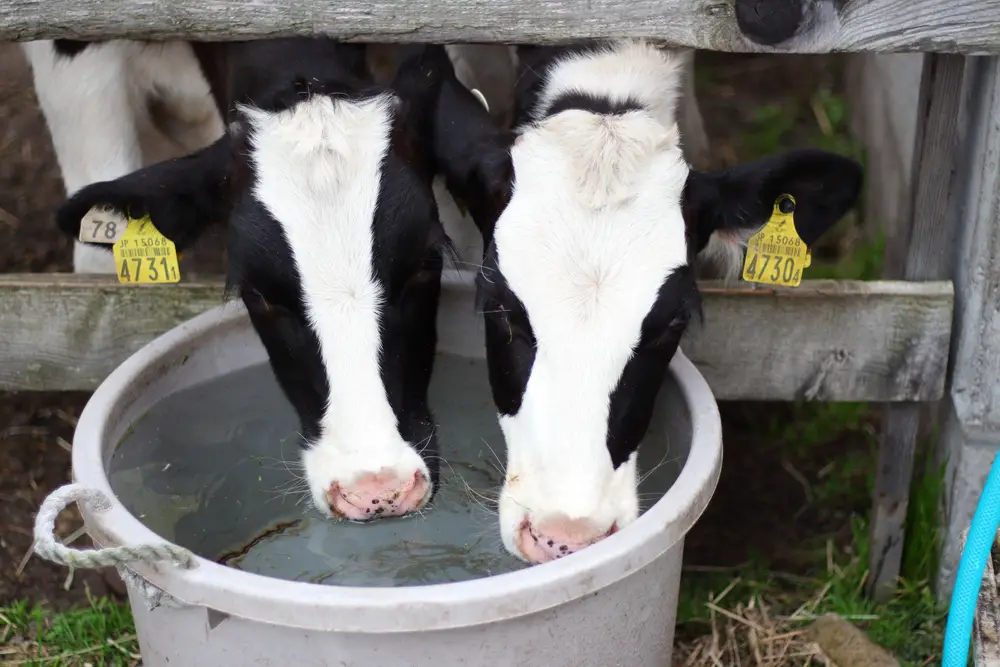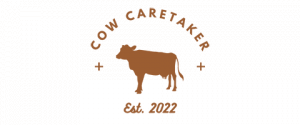Adult cows typically drink water only (with a strong preference for freshwater) while calves drink their mother’s milk. However, some adult cows drink milk too when they self-suckle as a way of relieving the pain of a full udder.
Generally, cows only drink in short bouts and up to 12 times a day. Dairy cattle consume around a gallon of water per 2.2 lbs of milk produced and they’ll also gain hydration through eating damp grass.
Table of Contents
Typical Cow Water Intake
A 1,000 lb animal requires around 15 gallons daily, and a dairy cow, such as a Holstein-Friesian, drinks most of that within 90 minutes of milking, so large quantities of water must be available at all times.
Daily water intake can range from 3 to 50 gallons, according to weight, age, production phase, and ambient temperature. Consumption tends to rise from one gallon per 100 lb in winter to almost two gallons per 100 lb in summer. Consequently, adult beef cattle need the most abundant water supplies.
Will a Cow Only Drink Water?
Some cattle are rather sensitive when drinking anything but clean water, and they can refuse water that doesn’t smell or taste fresh. Cows will drink small amounts of salt water but it can lead to salt poisoning.

Cows can also drink plant-based milk including almond and soy milk, but prefer their own milk. Many dairy cow farmers will have experienced a cow gulping down the entire contents of a pail of milk left inadvertently within reach.
On rare occasions, a cow might even drink a bucket of soapy water. Cows will also drink (or at least taste) any type of liquid offered to them including cordial and sodas.
Cows That Self-Suckle
While it is not usual for a bovine to drink milk, some cows that have suckled their own udders may develop a liking for milk and may even suckle other cows. Cows suckling cows is to be avoided due to the damage they can cause to sensitive udders and teats.
Breaking a cow from the habit of milking her own teats can be challenging naturally, so fitting a suckling ring or a wide metal collar can prevent them from doing it. However, a cow drinking its own milk does not seem to cause harm, and instead, often improves her body condition score and make her coat shinier.
Some farmers follow an old method of feeding a cow her own milk straight after calving to prevent milk fever or calcium deficiency in the blood. Bull and heifer calves drink their mother’s milk and colostrum for the first months of their lives.
Places Where Cows Generally Drink
Cows will access water mainly from a trough or stock tank.
Other sources include dams, rivers, lakes, and ditches. If you use a groundwater source, ensure a flow of water in and out of the pond to prevent stagnation and the consequent attraction of mosquitoes.
Large quantities of fresh water must be available at all times. That may be difficult in some climates during the winter when water sources are frozen or inaccessible due to snow and ice.
Troughs should be thoroughly cleaned every few days with a dilute solution of chlorine to remove any bacteria left after a cow drinks. Just like us humans, contaminated water can lead to many health problems. Concrete hard-standing around the trough helps prevent the spread of disease by making the area easier to keep clean.
Troughs and Testing
Aim to test your water supply annually for nitrates and nitrides, pH levels, and the presence of coliform bacteria. Large quantities of magnesium and sulfate can cause diarrhea and affect its ability to absorb trace elements like selenium and copper.
Water that is high in iron can mean more dietary copper is required. Acidic water with a pH of under 5½ can cause acidosis.
What Do Baby Calves Drink?
Baby calves feed on colostrum which is a mother’s first milk. It is a very concentrated, golden-colored liquid a cow produces immediately after the birth of a newborn. The bioactive compounds and antibodies in colostrum are essential for health and growth.
For the following two to three months, baby cows drink milk or milk replacer (like baby formula) before suckling at their mother’s teat. Once a calf reaches six months of age, they start feeding on grains and forages. A calf should have finished weaning by 10 months.
